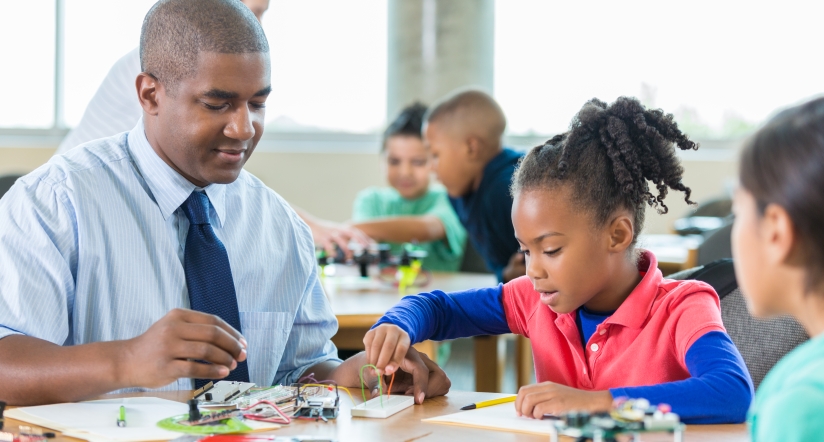
Our Work
Breadcrumb
To achieve our mission of connecting policies and practices to high-quality research, the Learning Policy Institute:
- Conducts and supports policy-relevant research. This includes conducting original studies to inform short- and long-term policy solutions; synthesizing and translating existing research; commissioning new research in high-need areas; analyzing policies, practices, and/or data sets; and performing rapid-response research addressing the pressing issues of the day.
- Marshals and disseminates research and evidence in a manner accessible to policymakers and thought leaders. To this end, LPI produces policy-relevant materials that make issues clear for the general public and policymakers, including policy briefs, reports, surveys, blogs, and op-eds on specific topics.
- Brings evidence to bear in policy arenas at the federal, state, and local levels. LPI responds to the needs and questions of policymakers and government organizations and hosts policy briefings, seminars, and other convenings with thought leaders and policymakers in state capitals and in Washington, DC. These highlight recent studies, take up current issues, and respond to pressing policy questions.
- Make evidence available and accessible to all those working to build a stronger education system. Specifically, LPI works with mission-aligned individuals and organizations to ensure that they have access to research and policy ideas that will support and encourage evidence-based policy solutions. Additionally, LPI communicates ideas and information via print, radio, television, and electronic media—highlighting the implications for evidence-based policies.
Culturally Responsive and Racially Conscious Research Guide
LPI's Culturally Responsive and Racially Conscious Research Guide is designed to help our researchers engage in more inclusive and responsive practices to ensure our work is equitable in process and impact.
Our Topics
Accountability and Continuous Improvement
Effective systems of accountability and continuous improvement support schools and districts in assessing progress, identifying needs, and overcoming barriers to teaching and learning.
School Finance
Evidence shows that adequate and equitable financing of public schools improves a range of outcomes for all students, yet disparities in school funding shortchange many children in the United States.
Assessment
Many states, districts, and schools are seeking to expand instruction to support higher-order thinking skills and are developing authentic performance assessments that measure student mastery on a deeper level.
School Leadership
Effective leaders are essential for school and student success. Preparing, retaining, and supporting strong school leaders can have a significant impact on students’ experiences and achievement.
Civil Rights and Racial Equity
Advances in education policy and practice are needed to mitigate the systemic disparities that prevent many Black, Indigenous, and other children of color from accessing a high-quality, empowering education.
School Redesign
Effective school design can support the whole child by providing high-quality academic learning, promoting strong interpersonal relationships, and offering authentic and culturally sustaining instruction.
Community Schools
Community schools are an evidence-based strategy to advance equity and reduce barriers to learning by providing the services needed to support student and family well-being.
School Safety, Discipline, and Restorative Practices
Research shows that the use of restorative practices improves achievement, reduces disciplinary and achievement gaps, and supports students’ mental health while making schools safer.
Deeper Learning
Curriculum, instruction, and assessment focused on deeper learning develop students’ abilities to think critically and solve complex problems, communicate effectively, work collaboratively, and learn independently.
Science of Learning and Development
Findings from the science of learning and development contain powerful lessons for improving education to help every student access opportunities and reach their full potential.
Early Childhood Education
Research shows that high-quality early learning provides young children with the foundation for healthy development and success throughout school and beyond.
Social and Emotional Learning
Students need to develop social, emotional, and academic competencies to succeed in life. School programs that foster social and emotional learning are associated with positive outcomes for attitudes, achievement, and educational attainment.
Educator Diversity
Growing research demonstrates the benefits for all students of teachers of color. Evidence also points to promising practices to help teachers of color overcome the unique barriers they face and expand diversity in the teaching workforce.
Teacher Preparation and Professional Learning
Teachers who receive thorough preparation and are supported with high-quality professional learning opportunities throughout their careers are better equipped to meet the needs of all their students.
Educator Quality
Schools need diverse, well-prepared educators. A high-quality educator workforce requires investments in teacher preparation and learning, policies to increase recruitment and retention, and strategies to sustain educator capacity to create and innovate.
Teacher Recruitment, Retention, and Shortages
Teacher turnover and shortages hurt student outcomes and well-being. Research identifies a number of evidence-based strategies to recruit and retain a diverse, high-quality teacher workforce.
Equitable Access and Opportunity
Inclusive, well-resourced, high-quality schools that ensure all children have opportunities to learn and thrive are necessary to overcome historical and contemporary social and educational inequities.
Whole Child Education
A whole child education prioritizes the full scope of a child’s developmental needs, creating safe learning environments and rich learning experiences to ensure every child reaches their full potential.
